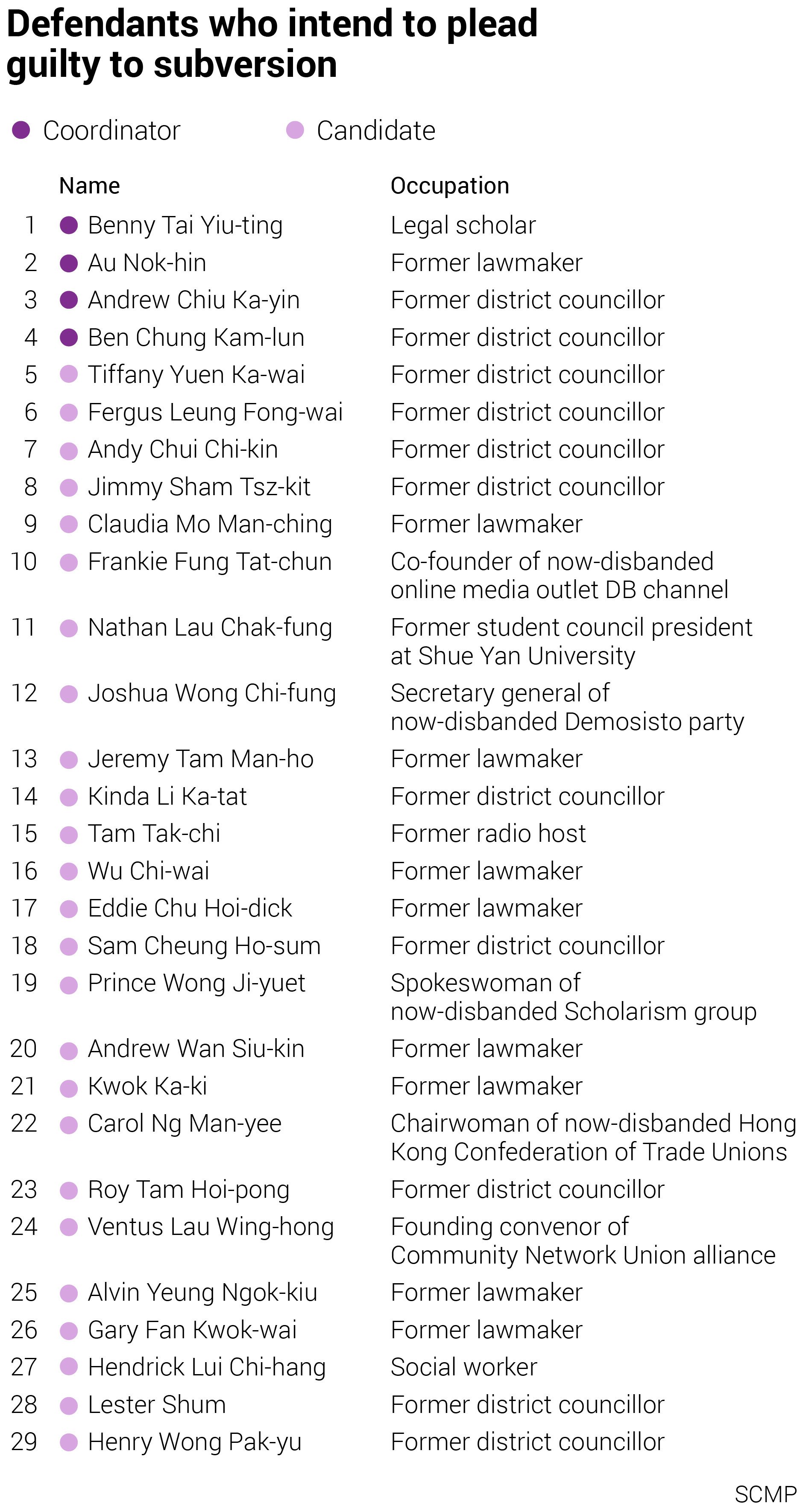
National security law: 29 of 47 Hong Kong opposition figures to plead guilty to subversion charges over unofficial primary election
- Those intending to admit liability in coming court proceedings include legal scholar Benny Tai, three coordinators, activist Joshua Wong and 24 other candidates
- The 18 defendants who plan to plead not guilty will stand trial before a three-judge panel
The defendants who intend to admit liability in the High Court trial are jailed legal scholar Benny Tai Yiu-ting, said to be the mastermind of the poll, three other coordinators and 25 candidates.
During proceedings in June, former lawmaker Au Nok-hin, one of the organisers of the two-day primary held in July 2020, apologised to other defendants for his inability to ensure the legality of the event and several other candidates explained their decision to plead guilty.
“I have lost interest in fighting a meaningless legal battle,” former district councillor Henry Wong Pak-yu said.

The remaining 18 defendants who will plead not guilty will stand trial before a three-judge panel after justice minister Paul Lam Ting-kwok ordered that a jury be dispensed with on grounds including the “involvement of foreign factors” in the case.
Statutory curbs on reporting pretrial proceedings had barred the press from divulging how the defendants intended to plead.
But a magistrate lifted the restrictions on Thursday on the application of four of the 47 defendants. The High Court ruled in a landmark judgment earlier this month that judges must relax reporting curbs upon the request of the accused.
Hong Kong opposition activists to face trial without jury in subversion case
The 47 face a joint charge of conspiracy to subvert state power under the national security law, which also criminalises acts of secession, terrorism and collusion with foreign forces. Many of them have been remanded in custody since March last year.
Prosecutors have said the primary was a “massive and well-organised scheme” to paralyse the government and topple the city’s leader by securing a controlling majority in the Legislative Council.

The primary’s winners, had they been elected, were said to have pledged to block government bills and budgets indiscriminately in a bid to force then chief executive Carrie Lam Cheng Yuet-ngor to step down in the wake of anti-government protests in 2019.
Prosecutors have claimed the conspiracy was part of a “destructive manifesto in 10 steps to ‘mutual destruction’” inspired by Tai, who aimed to undermine the government by manipulating the electoral system.
“The endgame – that is, the last steps of the road map – was to bring about an acute crisis in Hong Kong triggering bloody crackdown and ultimately to lobby foreign countries to impose political and economic sanctions on the mainland and the city,” prosecutors said in their 139-page case summary.
“The impugned objective was a clear attempt to subvert the state power, paralyse the operation of the … government by disrupting the normal and systematic running of Legco and ultimately bringing down the government as a whole.”
The prosecution argued a key part of the primary involved candidates submitting a nomination form, paying a HK$10,000 (US$1,275) deposit and confirming they “agree and support the consensus of the coordination” led by Tai and Au.
Thirty-four of the defendants charged in the present case also endorsed an online declaration, titled “Resolute Resistance, Inked Without Regret”, which served as proof of their “unwavering pledge” to achieve their common goal regardless of any legal consequences, the prosecution said.
The signatories vowed to compel the administration to accede to protesters’ five main demands, including the withdrawal of charges against them, holding police accountable for using excessive force during the 2019 unrest and relaunching political reform to achieve universal suffrage.
Facebook ‘secrets’ pages shut down following Hong Kong civil servant arrests
Those who indicated their intention to plead guilty during proceedings in June included former district councillors Andrew Chiu Ka-yin and Ben Chung Kam-lun, two of the five activists regarded as coordinators. Chiu had said he was sorry to “anyone who had helped organise the poll”.
The 25 candidates who plan to admit the subversion charge include activists Joshua Wong Chi-fung, former lawmakers Wu Chi-wai and Alvin Yeung Ngok-kiu, and ex-district councillors Lester Shum and Jimmy Sham Tsz-kit.
Some indicated their intention to plead guilty with what appeared to be a sarcastic undertone. When asked to affirm his admission to the prosecution’s summary of the case, Tam Tak-chi, a former radio host known as “Fast Beat”, said: “I agree with the script.”
Activist Frankie Fung Tat-chun said in Mandarin: “I plead guilty. I know I was wrong.”

Ventus Lau Wing-hong, organiser of a series of mass rallies during the social unrest in 2019, said he admitted the charge out of “my love for my country”, and that the prosecution’s summary “means exactly what it says” and was “an imprint of history”.
The 18 who have denied the charge include activist Gordon Ng Ching-hang, a coordinator of the primary, former lawmakers Leung Kwok-hung, Lam Cheuk-ting and Raymond Chan Chi-chuen, and journalist turned activist Gwyneth Ho Kwai-lam.
11 Hong Kong opposition figures ‘intend to plead guilty to subversion charges’
Only two of the 29 defendants who intend to admit liability are out on bail, compared with 11 out of 18 defendants pleading not guilty who have been granted temporary release.
The 29 will appear in the High Court in groups of one to five, depending on their alleged roles, between September and November.
Conspiracy to subvert state power is punishable by up to life imprisonment, with a minimum jail sentence of 10 years in serious cases.
